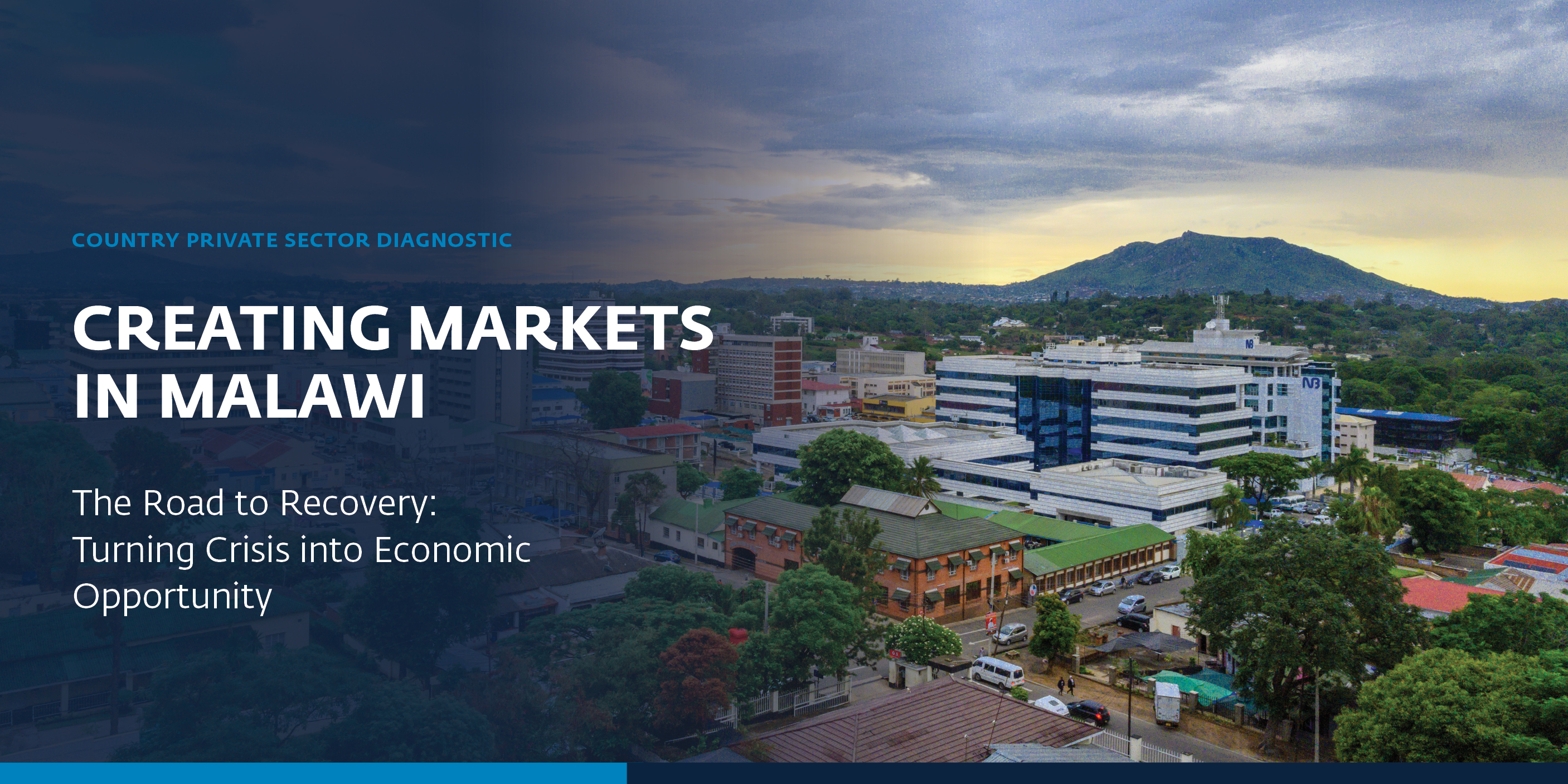
Blantyre, Malawi, July 19, 2021—Malawi can build a robust private sector, create jobs, and more quickly recover from the COVID-19 pandemic by introducing targeted reforms and attracting investment in key sectors, finds a report from IFC and the World Bank published today.
The report, the Malawi Country Private Sector Diagnostic (CPSD), examines opportunities and constraints in four sectors: energy, digital infrastructure and services, transport and logistics, and agribusiness. It outlines reforms that could increase private investment, contribute to growth, and support job creation. The reforms the report recommends would help to strengthen fiscal fundamentals, increase access to reliable power, improve markets, and promote commercial agriculture.
The report also notes that COVID-19 has highlighted the importance of digital connectivity. It says expanding digital inclusion could help more Malawians earn an income and develop skills for the growing digital economy both during—and after—the pandemic.

"Malawi is on a growth trajectory, and investment in the four key sectors outlined in the CPSD will especially empower women and young people in the country who are entrepreneurs," said Amena Arif, IFC's Country Manager for Malawi. "Supporting these entrepreneurs, by expanding digital connectivity and increasing digital literacy, could positively impact the economy," she added.
"We see significant private investment potential in Malawi to boost economic growth and are ready to work with our partners to seize these opportunities and create new markets," said Hugh Riddell, World Bank Country Manager for Malawi.
The report calls on the government to act decisively to mitigate the adverse effects of the COVID-19 pandemic on health, human capital, and the economy by introducing policy reforms in the four sectors.
The four sectors were selected from an analysis of recent performance—including trends in trade, investment, and productivity—and a modeling of the country's current capabilities and economic fitness, such as the potential of each sector to act as a job multiplier.
IFC has produced CPSDs in 25 countries, including the CPSD published today for Malawi, with more than 30 ongoing in other countries. The CPSDs are jointly conducted by IFC and the World Bank. They are designed to provide in-depth economic analyses that identify opportunities for the private sector to combat poverty and create opportunity.
The Malawi CPSD can be downloaded here.
About the Country Private Sector Diagnostic (CPSD)
The World Bank Group's Country Private Sector Diagnostics aim to identify sectors where private sector solutions can create or expand markets and make substantial contributions to development impact. Each CPSD includes an assessment of the state of the private sector, identification of near-term opportunities for private sector engagement, and recommendations of reforms and policy actions to mobilize private investment and drive solutions to key development challenges. Selected sector assessments, conducted with significant input from teams across the World Bank Group and from external partners, provide valuable information on the challenges and opportunities to better leverage the private sector to achieve developmental objectives. By combining both economy-wide and sector-specific analysis of constraints, the CPSD helps to create a common analytical basis to shape policy dialogue and guide transformational private investment. Analysis and recommendations of the CPSD inform the World Bank Group's country engagement process, as inputs to the IFC Country Strategy, the broader Systematic Country Diagnostic, and the World Bank Group Country Partnership Framework, as well as lending and advisory services. All CPSDs can be found at ifc.org/CPSD.
About IFC
IFC—a member of the World Bank Group—is the largest global development institution focused on the private sector in emerging markets. We work in more than 100 countries, using our capital, expertise, and influence to create markets and opportunities in developing countries. In fiscal year 2020, we invested $22 billion in private companies and financial institutions in developing countries, leveraging the power of the private sector to end extreme poverty and boost shared prosperity. For more information, visit www.ifc.org
About the World Bank Group
The World Bank Group plays a key role in the global effort to end extreme poverty and boost shared prosperity. It consists of five institutions: the World Bank, including the International Bank for Reconstruction and Development (IBRD) and the International Development Association (IDA); the International Finance Corporation (IFC); the Multilateral Investment Guarantee Agency (MIGA); and the International Centre for Settlement of Investment Disputes (ICSID). Working together in more than 100 countries, these institutions provide financing, advice, and other solutions that enable countries to address the most urgent challenges of development. For more information, please visit www.worldbank.org, www.miga.org, and www.ifc.org
Stay Connected
www.facebook.com/IFCwbg
www.twitter.com/IFC_org
www.youtube.com/IFCvideocasts
www.ifc.org/SocialMediaIndex
www.instagram.com\ifc_org
Contacts
Stay Informed
Sign up to have customizable news & updates sent to you.